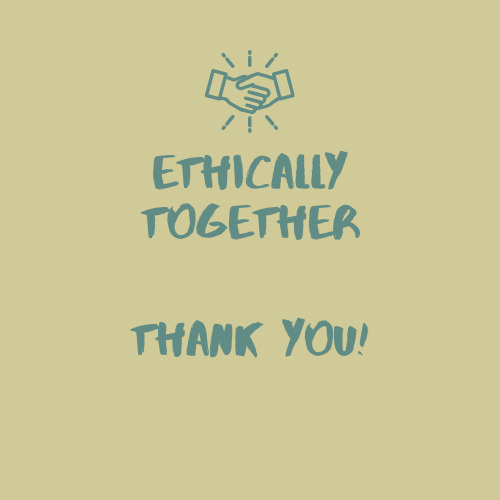Text
Thank you very much!
Here comes the end of our story. We provide you some takeaways that we think are extremely important to keep in mind.
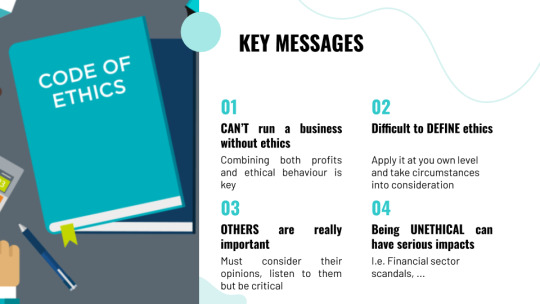
Thank you very much for your interest! Feel free to ask questions and let us know what you think about our different posts! It was a pleasure for us to work on this blog and to work in a team.
Have a very good day!
Axelle, Stijn, Alison & Roy 😊

0 notes
Text
COVID-19 = Better environment
As mentioned in the previous, the COVID-19 crisis raises lots of issues and questions regarding ethics but it also raises many questions about sustainability.
Indeed, lots of people argue that the COVID-19 crisis can help to reshape the world more sustainably. In the following video, you can see how the coronavirus restrictions have been beneficial for the environment.
https://www.facebook.com/watch/?v=2916616878406656
Nevertheless, while it is beneficial for the world, it is extremely nefast for the economy and people. Here are some facts regarding the effects of the crisis:
1. Planet: Human activity is strongly related to climate change. The lockdown has resulted in rare sightings of blue skies from Beijing to Delhi, and worldwide CO2 emissions are predicted to fall by 8% in 2020.
2. People: COVID-19 has been hailed as the “big equalizer,” but the reality is that we aren’t equally resilient as a society. Socio-economic status is strongly related to vulnerabilities of all sorts, with the poor and underprivileged in harm’s way to a disproportionate extent.
3. Profit: We cannot survive for long without economic activity and the creation of financial value. Millions of businesses are failing in the face of the pandemic and as many as 40% of businesses may not reopen after this disaster.
It is clear that the coronavirus situation has positive impact on the environment but at the same time, it is extremely nefast for the economy. Therefore, in the future, a compromise needs to be found between economic success and a sustainable world and environment.
According to us, it is not possible to resolve this dilemma at an individual level. It is a global issue that may be resolved if people argue on one common ethical approach.

Here, you can find some interesting articles about the strategies which may be adopted by countries after the coronavirus crisis to ensure both global recovery and positive impact on climate and sustainable resource development.
https://www.iisd.org/library/coronavirus-shaping-sustainable-development
https://www.bbva.com/en/tr/sustainability-key-to-the-new-global-order-in-the-post-covid-19-world/
Our opinion:
The Coronavirus crisis impacts everyone from all over the world. Some people have lost their jobs, other people have lost family members or friends, others cannot survive because they haven’t the means to eat... The situation is dramatic and recovery is more than necessary. However, the crisis was also beneficial regarding certain domains such as the environment. People have learned to live differently, the globalization stopped during a few months, etc. And this also raises lots of concerns about the future.
Business global expansion & globalization have been very popular for a few years but now, it is maybe time to reflect on this and to find other ways to do business which will have a less negative impact on the planet.
As seen in this last section, before the coronavirus crisis, there were various challenges when businesses wanted to expand abroad such as the local culture, the corruption, the country laws, etc. With the Coronavirus, businesses in all countries had to find new ways to make profits, they had to explore other strategies and now, after sanitary-crisis asks them to face a new challenge “The new order that we build must be focused on sustainability”.
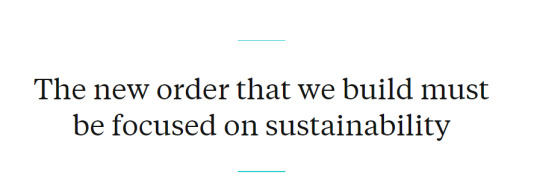
References:
Bhattacharya, C. (2020, May 15). How the great COVID-19 reset can help firms build a more sustainable future. Retrieved June 04, 2020, from https://www.weforum.org/agenda/2020/05/the-covid-19-reset-sustainability/
0 notes
Text
The First Global Ethics Council
In the previous posts, we mentioned that ethics is not a universal concept. Not every country, not every people have the same definition of what it means to be ethical. Nevertheless, we also think that it may be beneficial to redefine what is ethics and to find a common-sense behind this concept for everyone.
Surprisingly, after having made some research about the subject we found that in London, senior practitioners from all around the world have launched a Global Ethics Council to elevate the ethical standards in the PR industry (Public Relations). This makes us think that maybe the definition of Ethics can become something universal and common across the world in the future.
According to Gallagher, the inaugural chairman of the Council, raising ethical standards would add value to the business because it will reduce corruption, it will improve the integrity, etc. in the PR industry.
He knows that it is not easy to establish common ethical standards for all countries but he thinks that ethical communications should make the world a better place. The creation of this Global Council seems to be a huge advance since it will help to raise even higher global standards of ethical behavior.

There aren’t lots of research and articles about this Council since it is very recent (20 May 2020) but it gives us hope that in the future things can change and especially, thanks to the COVID-19 crisis which raises lots of questions and issues regarding ethics.
References:
Sims, M. (2020, May 20). PRCA Launches First Global Ethics Council. Retrieved June 04, 2020, from https://www.provokemedia.com/latest/article/prca-launches-first-global-ethics-council
0 notes
Text
What Do We Think About It?
After having seen the video and talked together, we think it is important to give you our opinion about the expansion of a business aborad and the ethical issues that arise.
As DesJardins explains, we cannot say if there are universal standards concerning ethics or if each country has its own standards and what is good in one country can be bad for another. Nevertheless, even if we are not sure about this, we can all agree on one rule. If you go global, if you enter a new market, you have to COMMUNICATE and COLLABORATE. It is the only way to avoid conflicts with local people. You, as a business, need to consider local people's opinions and if you are not sure about their vision of ethics, you need to ask to ensure a successful expansion.
However, if there is no common sense of ethics, it may be necessary to redefine what is ethics. DesJardins asks for a common process, we ask for common rules, in the case of business. Why cannot we find universal ethical norms for business? This would make things easier.
What do you think about it? Do you share our opinions? Feel free to comment on this post and share your thoughts!
0 notes
Text
Ethics and International Standards Behaviour
youtube
As we said in the previous post, the globalization of business has raised new challenges for business but not only. It also raises issues and concerns for ethics. As we have seen in the previous section, countries have different cultures and different standards but are there a common, universal vision of what is ethics?
In this video, Joseph R. DesJardins raises some interesting questions: What does it matter that different cultures have different expectations and standards? Do we simply accept the status quo which claims that “in Rome, do as the Romans do”? Or are there standards that are more objective, more universal? Is ethics dependent upon culture or is it something that is more rational and independent of culture?
He also claimed that “If we assume that every culture has its standards and that standards are valid within each culture, there is a problem. This results in asking ourselves: who is going to win this conflict?”
He says that to avoid this issue, there would be a rational process that will fit all situations. Not a rational answer, a perfectly defined answer but a process that can be manipulated to fit each situation.
Actually, this video is really interesting and if the summary that we provide is not enough for you, you can also have a look at it.
References:
Al., L. (n.d.). Introduction to Business. Retrieved June 04, 2020, from https://courses.lumenlearning.com/wmopen-introductiontobusiness/chapter/ethical-challenges-in-the-global-environment/
0 notes
Text
Entering New Markets
Now that we know what it means to be an ethical business, it is time to have a look at the ethical GLOBAL business.
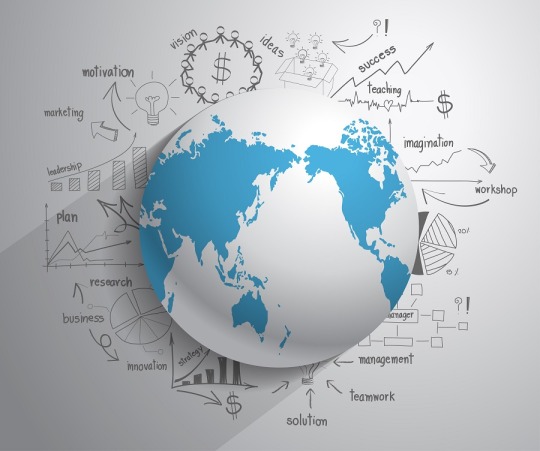
We have seen in previous posts that it is not easy to run a business while at the same time always adopting ethical behavior. This complexity doesn’t decrease when the business enters new markets. On the contrary, it becomes even more difficult to combine both success and ethical behavior since the company needs to take more things into consideration.
To ensure a successful expansion, the business needs to comply with multiple issues including working standards, cultural differences, corruption, environmental laws, countries' regulations, etc. As we have seen in the last section, countries have different cultures and different standards that lead people to make different choices and decisions. Following this logic, a company that wants to expand its operations needs to respect these differences and acts in accordance with the values of the country that it wants to enter.
0 notes
Text

Hello everyone, let’s introduce the last step of our storyline. Today, we will discuss what it implies for businesses to expand on a global level.
1 note
·
View note
Text
What People Think About It?
To support or refute our opinion about a possible official surveillance system in European countries such as the Chinese National Credit System, we conducted a little survey among our families and we come up with these results.
Our question was: Do you think that the adoption of an official surveillance program (such as the Chinese Social Credit System) in our countries (European countries) is acceptable and ethical?

To be honest, we were a little bit surprised by the answers as we thought that people would be more reluctant to accept such a program. As you can see on the graph, almost 50% of our respondents answer “Yes but under certain conditions”. That means that they think this system is neither unacceptable nor unethical.
Here you can see some of the answers we get:
Respondent 1: Yes, I would accept this kind of system but I would prefer to keep my localization secret.
Respondent 2: Yes, this kind of program can be a good idea for our countries, but I don’t want to be monitored/tracked at home.
Respondent 3: I think this kind of surveillance program is good to adopt only for prisoners who have been released and people suspected of infraction, terrorism attacks, etc.
Respondent 4: Yes, I think we need to adopt this kind of program since it is good for the environment and it will push people to respect more the rules. We must learn from Asian countries which are less individualistic than European countries.
These says are very interesting. We didn’t imagine that people were thinking in this sense but after reflection, we think that indeed, this kind of program can also be beneficial for European countries and that under certain conditions, this will not be an obstacle to human rights and freedom.
That’s your turn now, lets us know: What is your opinion about this surveillance of citizens which seems to take place in our countries and what does your entourage think of it? Let us know, under this post what are your results. 😊
0 notes
Text
What About An Official Surveillance Program in European Countries?

In the last post, we had a look at the Chinese Social Credit System. This leads us to ask ourselves “Would it be possible to integrate such a program in Western European Countries, knowing the difference of culture “separating” the two continents (Asia and Europe)?
According to us, that could be extremely difficult to come up with such a program in European countries. We love our freedom, we are complaint a lot about privacy concerns, especially now with the increasing use of technological devices such as Alexa or Google Home. We know that we are not totally free and that we are under surveillance for the benefits of companies but can we accept an official “surveillance system” like the Chinese Social Credit System? Is that democratic? Can we accept to be under surveillance for the benefits of the government?
Some articles already draw their attention to this subject. For instance, in 2015 the New-York Times Magazine has published an article entitled “Europe Is Spying on You” by Nils Muiznieks who was the council of Europe Commissioner for Human Rights between 2012 and 2018. The author mentioned that, due to previous terrorist attacks, European entered a mass electronic surveillance.
France for instance has adopted a controversial law on surveillance that permits major intrusions, without prior judicial authorization, into the private lives of suspects and those who communicate, live, or work in the same place or even just happen to be near them.
He wrote that now, governments argue that “to guarantee our security, we have to sacrifice some rights” but as he also mentioned, shifting to mass surveillance, leads to undermining democracy and that is maybe not the solution.
Indeed, Marc Trévidic, the former chief terrorism investigator for the French Judicial system thinks (concerning the French legislation) that this kind of process (mass surveillance) cannot solve actual problems because it will foster new ones. As he mentioned, “an intelligence law should protect citizens against terrorism but also against the States”.
Those articles make us confident that such a system (Chinese National Credit System) will not be accepted in European countries. If we cannot accept being under surveillance for preventing us from terrorist attacks, do you really think we can accept to be under surveillance to establish more trust in the country? From our point of view, that is hard to believe but what do you think about it?
References:
https://www.nytimes.com/2015/10/28/opinion/europe-is-spying-on-you-mass-surveillance.html
https://www.justsecurity.org/36098/era-mass-surveillance-emerging-europe/
0 notes
Text
The Chinese Social Credit System
First of all, do you know what is the Chinese Social Credit System?
For those who do not know, the Chinese Social Credit System is a ranking system that monitors and scores the behavior of Chinese citizens. According to their scores, people can be rewarded or punished. The objective of this program is to reinforce the idea that “keeping trust is glorious and breaking trust is disgraceful”. (Ref: https://www.businessinsider.fr/us/china-social-credit-system-punishments-and-rewards-explained-2018-4)
To gain more knowledge about this program, we will have a look at the following article: China's Social Credit System is pegged to be fully operational by 2020 — but what will it look like? It is an article from Christina Zhou and Bang Xiao, which has been posted on the 1st of January 2020.
The authors define the Chinese Social Credit System as a data-driven system which is designed to monitor and engineer better individual and business behavior by awarding the trustworthy and punishing the disobedient. The system blueprint was released in 2014 and the law is expected to be introduced in the coming years. It is still not clear how exactly the system will run but authors give an idea. The SCS is made up of three interconnected components: A master database, a blacklisting system, and a reward mechanism.
As we can imagine, the use of big-data collection and analysis combined with the increased use of surveillance technology across China raises concerns about privacy and human rights but Dr. Delia Li, which is a senior lecturer in Chinese studies at the University of Melbourne’s Asia Institute says that even if it always difficult to predict what will happen in China, she is quite confident that the SCS will be implemented despite all the obstacles because there wasn’t much resistance from the public.

As you can see above in the article summary, it is not clear what will happen in China in the coming years. Nevertheless, it seems clear that a “surveillance” program will be put in place and that Chinese people are not resistant to it.
What do you think about it? Are you surprised by the absence of reactions from Chinese people? 😊
0 notes
Text

Hello!
During today’s Ethics Course, we covered two main topics. First, we learned about Confucianism Morality, and second, we had a great conversation about the Chinese Social Credit System. Throughout this post and to add a new piece to our storyline, we will focus on the second part of the course because the subject brings up lots of questions and we think it is interesting to explore this subject with you because it makes direct link the National Culture which fits with the previous subject “Organizational Culture”.
0 notes
Text
The Slippery Slope
Apart from the “ill-conceived goals” factor, we think that the barrier of the slippery slope also needs to alert. Even small infractions can snowball, so the tendency for minor unethical behavior to swell into more serious proportions over time because of this ‘slippery slope’ effect. We have read a study in the journal of applied psychology which published in 2014 titled The Slippery Slope: How Small Ethical Transgressions Pace the Way for Larger Future Transgressions, the authors have presented the existence of this often mentioned slope. This study indicated a typical example which is the largest scheme in history, a man called Bernard Madoff who stole a total amount of $18 billion from his clients. He claimed that it started with he taking a little bit, like a few hundred or thousand, then he felt comfortable with that and before he know it, it snowballed into something even big.
We agreed with the authors that unethical behavior may create changes in how a person regulates their actions and thoughts, so that people can become out of touch with their moral compass via a series of gradual changing ethical choices. For instance, it can start with workers gradually misreporting hours worked, exaggerating different aspects of job performance over time or overstating a product’s positives. These kinds of dishonest behaviors seem fairly harmless, it might let small indiscretions grow into major violations if left unchecked. This study also suggested organizations should pay attention to maintain moral engagement which can help to stop gradual slide down of the slippery slope. The authors emphasized it will work by inducing a prevention which focus of ethical vigilance. Even when temptation starts to occur and the justifications of unethical are readily to find. Thus, the first step for organizations is to uphold a code of ethics and set the tone from the top, and it is important to enforce. There is no impact for a code of ethics by itself, but when perpetually enforced, it creates an impact and culture makes it mean something.
References: Welsh, D, Ordóñez, L., Snyder, D., & Christian, M. (2014). The Slippery Slope: How Small Ethical Transgressions Pave the Way for Larger Future Transgressions. Journal of Applied Psychology. Advance online publication.
0 notes
Text
Barriers to An Ethical Organization: Ill-Conceived Goals
Let’s now talk about the barriers to an ethical organization.
During our Ethics course class, we discussed an interesting article: Ethical Breakdowns by Bazerman & Tenbrunsel (2011). This article shows what are the five barriers to an ethical organization.

Feel free to read them all but in this post, we will focus only on one factor which contributes to a culture of ethical wrongdoing: ill-conceived goals. We found it is the most common phenomenon that we can relate to and even some of us had encountered this kind of situation.
Ill-conceived goals mean leaders setting incentives and goals to promote a certain behavior, however it may encourage a negative effect in reality. A real-life example is that a clothing-retail company called ‘Pull & Bear’, management found that the colleagues in the retail department always late to work. Hence, they gave salespersons a goal that employee should arrive 15 mins early at work for a month to improve their working attitude. However, some workers tried to adjust their time-in record earlier when they were still late to work. Therefore, we agree that leaders need to set goals from the perspective of those whose behavior they are trying to affect but they also need to think about their potential responses.

0 notes
Text
Bento and Its Great Company Culture
Now, that we know what is Organizational Culture and Ethical Organizational Culture. Let’s have a look at a real-life example: Bento.
What is Bento? Bento is an expense management software that helps small businesses control employee spending with smart employee debit cards.
The motto of Bento is “Be Human”. The company supports all members in all aspects of their lives. It helps employees to enjoy their life even beyond the workplace. The company’s leaders are mentors for employees and it doesn’t stop here. Indeed, the mentality of helping and support each other is transferred throughout the entire company from colleagues to customers and partners.
What makes Bento’s company culture great? No matter their level, employees feel valued in all aspects of their lives, including both their professional and personal aspirations.
In the following picture, you can see the different “rules” of the company regarding the behavior to adopt with stakeholders.
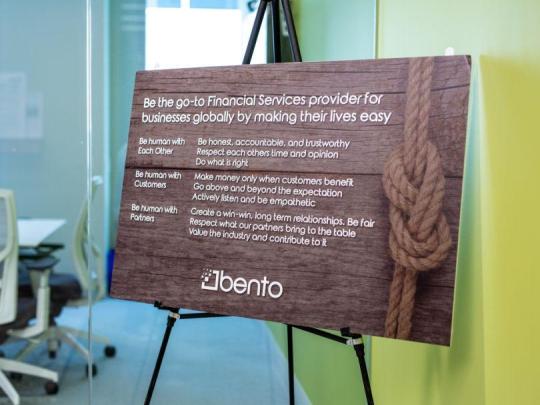
References:
https://builtin.com/company-culture/company-culture-examples
https://bentoforbusiness.com/?utm_source=BuiltinChicago
Feel free to give other examples of Companies who do good in terms of organizational culture! 😊
0 notes
Text
Ethical Organizational Culture
Now that we know what is Organizational Culture, let’s see what is Ethical Organizational Culture.
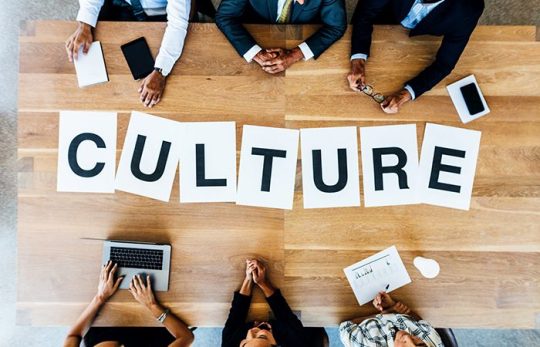
For this purpose, we think it is good to use this definition:
“Organizational culture is civilization in the workplace.” — Alan Adler
Culture is a social control system. Here the focus is the role of culture in promoting and reinforcing “right” thinking and behaving, and sanctioning “wrong” thinking and behaving. Key in this definition of culture is the idea of behavioral “norms” that must be upheld, and associated social sanctions that are imposed on those who don’t “stay within the lines.” This view also focuses attention on how the evolution of the organization shaped the culture. That is, how have the existing norms promoted the survival of the organization in the past? Note: implicit in this evolutionary view is the idea that established cultures can become impediments to survival when there are substantial environmental changes.
Here, the author makes clear that culture in an organization has the role to define what is right and what is wrong and according to us, that can be the basis of ethical organizational culture. As a business, you need to implement a culture that results in positive actions from your employees, your shareholders, etc.
What do you think about this definition? Do you agree with us that this seems to be the definition of an ethical organizational culture? In your own words, what do you think Ethical Organizational Culture is?
0 notes
Text
Organizational Culture
First of all, before identifying the barriers to ethical organizational culture, let’s define “organizational culture” by looking at different authors’ definitions that we found in an article of the Harvard Business Reviews. (Ref: https://hbr.org/2013/05/what-is-organizational-culture)
“Culture is how organizations ‘do things’.” — Robbie Katanga
That means that culture is consistent. It is the observable patterns of behavior in organizations.
“In large part, culture is a product of compensation.” — Alec Haverstick
That means that culture is powerfully shaped by incentives. The best predictor of what people will do is what they are incentivized to do.
“Organizational culture defines a jointly shared description of an organization from within.” — Bruce Perron
That means that culture is a process of “sense-making” in organizations. Sense-making has been defined as “a collaborative process of creating shared awareness and understanding out of different individuals’ perspectives and varied interests.”
“Organizational culture is the sum of values and rituals which serve as ‘glue’ to integrate the members of the organization.” — Richard Perrin
That means that culture is a carrier of meaning. Cultures provide not only a shared view of “what is” but also of “why is.” In this view, culture is about “the story” in which people in the organization are embedded, and the values and rituals that reinforce that narrative.
We hope that all these definitions are clear for you and that you get what is Organizational Culture. 😊
0 notes
